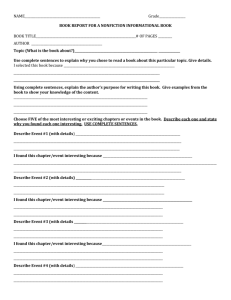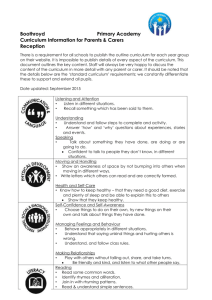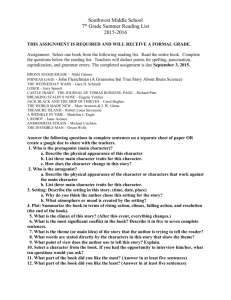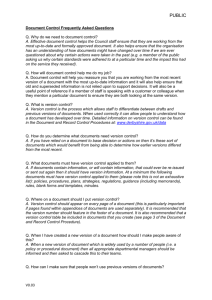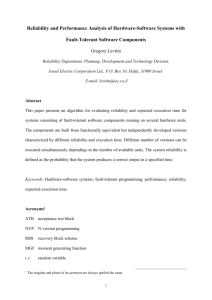Chapter 6 Exercises (pp. 166–169)
advertisement
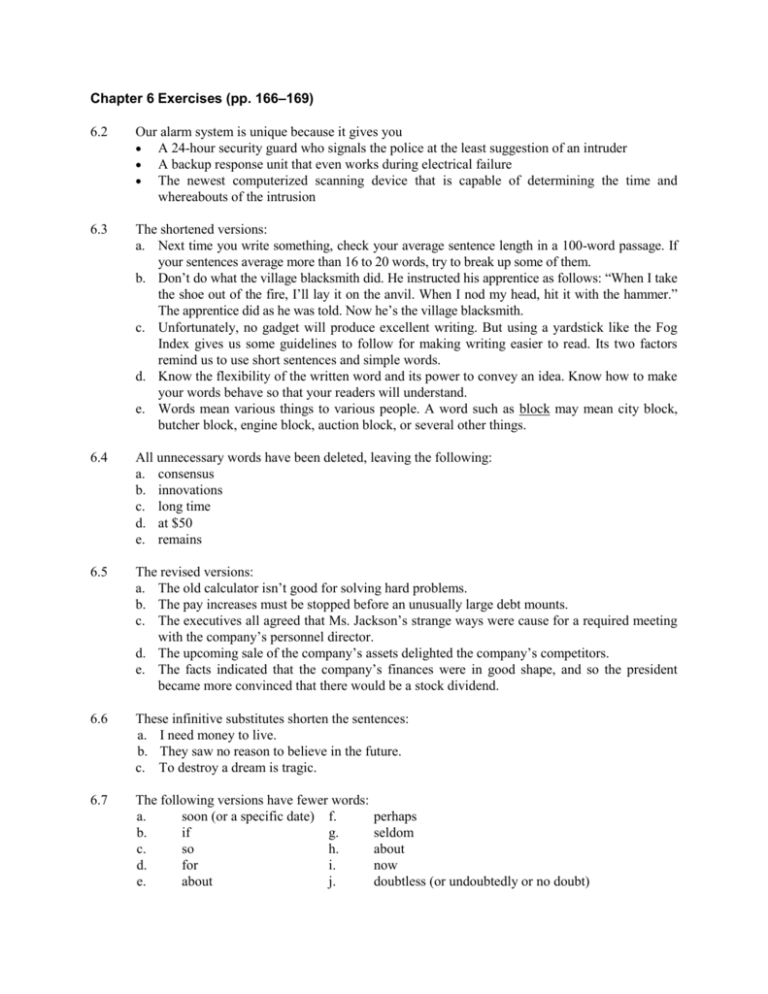
Chapter 6 Exercises (pp. 166–169) 6.2 Our alarm system is unique because it gives you A 24-hour security guard who signals the police at the least suggestion of an intruder A backup response unit that even works during electrical failure The newest computerized scanning device that is capable of determining the time and whereabouts of the intrusion 6.3 The shortened versions: a. Next time you write something, check your average sentence length in a 100-word passage. If your sentences average more than 16 to 20 words, try to break up some of them. b. Don’t do what the village blacksmith did. He instructed his apprentice as follows: “When I take the shoe out of the fire, I’ll lay it on the anvil. When I nod my head, hit it with the hammer.” The apprentice did as he was told. Now he’s the village blacksmith. c. Unfortunately, no gadget will produce excellent writing. But using a yardstick like the Fog Index gives us some guidelines to follow for making writing easier to read. Its two factors remind us to use short sentences and simple words. d. Know the flexibility of the written word and its power to convey an idea. Know how to make your words behave so that your readers will understand. e. Words mean various things to various people. A word such as block may mean city block, butcher block, engine block, auction block, or several other things. 6.4 All unnecessary words have been deleted, leaving the following: a. consensus b. innovations c. long time d. at $50 e. remains 6.5 The revised versions: a. The old calculator isn’t good for solving hard problems. b. The pay increases must be stopped before an unusually large debt mounts. c. The executives all agreed that Ms. Jackson’s strange ways were cause for a required meeting with the company’s personnel director. d. The upcoming sale of the company’s assets delighted the company’s competitors. e. The facts indicated that the company’s finances were in good shape, and so the president became more convinced that there would be a stock dividend. 6.6 These infinitive substitutes shorten the sentences: a. I need money to live. b. They saw no reason to believe in the future. c. To destroy a dream is tragic. 6.7 The following versions have fewer words: a. soon (or a specific date) f. b. if g. c. so h. d. for i. e. about j. perhaps seldom about now doubtless (or undoubtedly or no doubt) 6.8 Here are the pared-down versions: a. Writing is important. b. Prices will probably go up. c. We’ll decide that soon. d. I will summarize this experiment when it’s over. e. After she completed a satisfactory three-week trial period, we offered her a full-time job. 6.9 With the unnecessary modifiers removed, the sentences read as follows: a. High pay increases were given to the skilled and conscientious employees. b. The union’s proposals were inflationary, demanding, and bold. 6.10 The following versions contain no hedging: a. Someone has entered illegally. b. Things will get better soon. c. Your report shows we are losing money. d. Nancy has more influence over employees in the typing pool. e. I see by your letter that you’re leaving us. 6.11 With the indefinite starters removed, the sentences might read as follows: a. Several examples here show that Elaine can’t hold a position very long. b. A generous contribution to Mildred Cook’s retirement party would be appreciated. c. Generally reliable sources in Washington report today that the White House will soon make an important announcement. d. According to the rule, we cannot work overtime without permission. e. Your working late the next three Saturdays would be great. 6.12 Rewritten with parallel construction, the sentences might read as follows: a. Mr. Hill is expected to lecture three days a week, to counsel two days a week, and to write for publication in his spare time. b. She not only knows accounting but also reads Latin. c. Both applicants were in their thirties, had families, were college graduates, and had considerable experience; but they lacked social connections. d. This book was exciting, well written, and interesting. e. Don works hard and knows bookkeeping. 6.13 Here are the sentences with the awkward pointers removed: a. The vice president in charge of sales is responsible for the key to 34A; the production manager is responsible for the key to 35A. b. The key to 34A belongs to the vice president in charge of sales, and the key to 35A belongs to the production manager. c. The gold-embossed keys to 34A and 35A have been given to the production manager. d. John received his laser printer, and Megin got her dot matrix printer. e. The walnut desk cost $300 more than the oak desk. 6.14 These versions have the modifiers in the right place: a. We watched the countryside glide by as the train ran down the railroad tracks in a cloud of smoke. b. Ruby saw the seashell lying on the shelf. c. Judging by the information, I think we should buy the property. d. Sandy took the whole afternoon to clean up her desk, which was cluttered and filthy. e. The memo was ready to be signed after every word had been proofread. 6.15 The long strings of nouns may be broken up as follows: a. The focus of the meeting was a discussion of deregulation of bank interest rates. b. Following the recommendations of the government task force, we are revising our evaluation procedures for job applicants. c. The components of the production department’s program for quality assurance include employee training, supplier cooperation, and computerized detection equipment. d. The plan for reducing inventory in the supermarket warehouse will be implemented next month. e. The graduate placement program of State University’s business school is one of the best in the country. 6.16 Here the subjects are closer to the verbs: a. Trudy ran when she saw the bull pawing the ground. b. According to Ted, who is probably the worst gossip in the office (Tom excepted), it was Terri who mailed the wrong order. c. In his book Investment Capital Reconsidered, William Oberstreet writes of the mistakes made by bankers through the decades. d. After passing up several sensible investment opportunities, Judy Schimmel invested her inheritance in a jojoba plantation, despite the warnings of her friends and family. e. After the warehouse fire, the worst tragedy in company history, the president of U-Stor-It prepared an announcement for the press: The company was on the brink of bankruptcy. 6.17 The following versions no longer have camouflaged verbs: a. The employees adapted easily to the new rules. b. The assessor will determine the tax due. c. The employees’ identity must be verified daily. d. The board of directors recommended that Mr. Ronson be assigned to a new division. e. The vice president audited the books. 6.21 Corrected version of the e-mail: Our final company orientation of the year will be held on December 20. In preparation for this session, please order 20 copies each of the policy handbook, the confidentiality agreement, and the employee benefits manual. Please let me know if you anticipate any delays in obtaining these materials.





